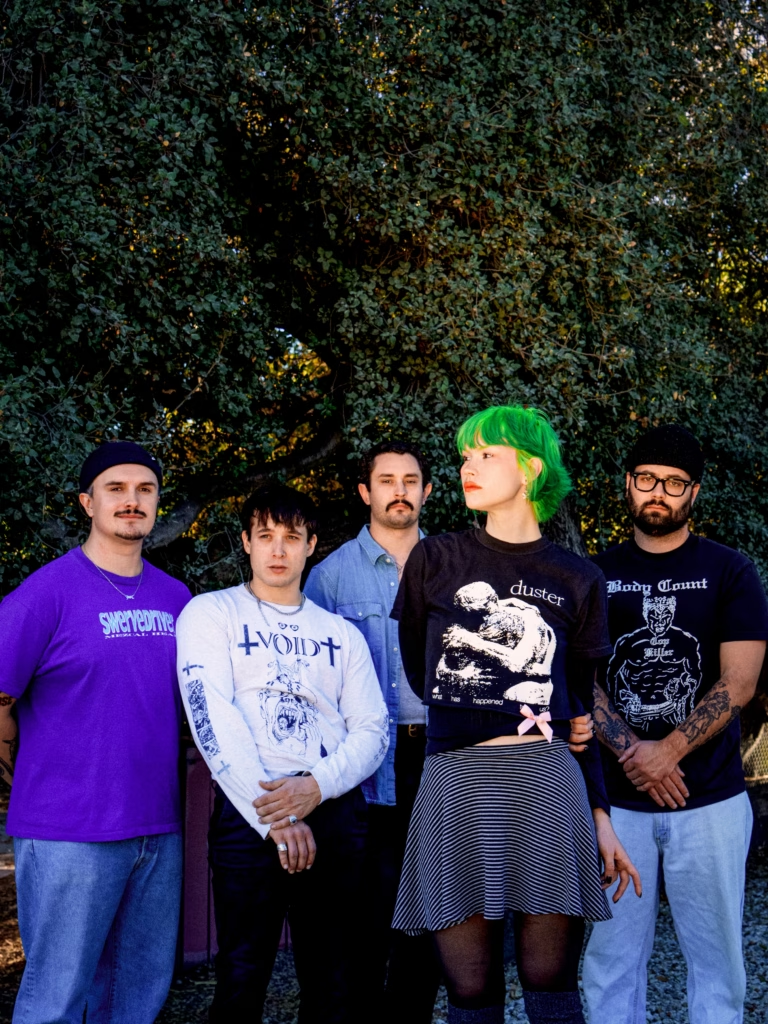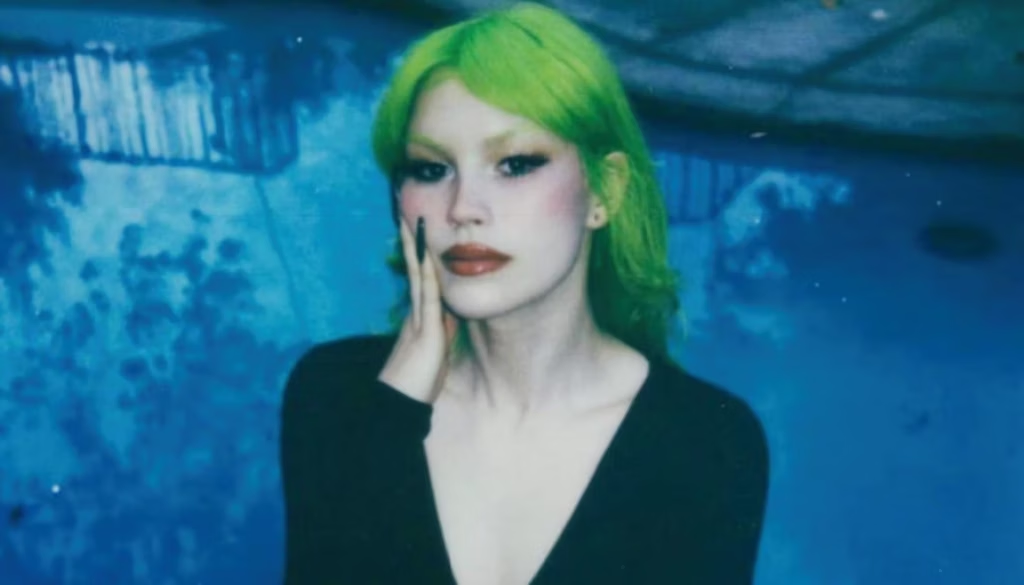A lot of things stand out when Scowl’s second album, Are We All Angels, blasts through the speakers: the urgent, overdriven guitars, the incessant, driving drums. In the eye of the proverbial storm is frontwoman Kat Moss— easily the band’s most magnetic presence. She’s always found the role curious, especially since she’s long seen herself as a trainee, learning on the job. “I was never the type to seek out attention,” Moss tells CONE, speaking from a gas station between tour stops.
“I had my first choir class when I was 13, and I joined choir when I was 15. That’s about as far as it went with regards to performing, until Scowl started, which was my first band, too,” she continues. “I was screaming when the band started, which is something I had no experience in, beyond screaming along to songs in the car. I hate the way my voice sounds on our demo. I had no idea what I was doing.”
As momentum built around the band, their riotous approach to hardcore gave way to adventurous experimentation, culminating in “Seeds To Sow,” a standout track on their 2021 debut album, Psychic Dance Routine. A throwback to old-school ‘70s punk, complete with a sizzling sax line, it featured clean vocals and proved to be a game-changer.
“Everyone was just curious how it would sound,” she recalls of the now-landmark song. “We were all surprised by how natural it sounded in the context of the song. From there, it was kind of this kismet thing. I began singing more and more. With this new album, I was especially interested to see what I could do. I was ambitious about pushing myself. Your voice is a muscle, the same as a bicep. And I feel like I’ve really strengthened and taken good care of it.”
Indeed, Are We All Angels is a muscular effort from Moss and the band. Twice the length of Psychic Dance Routine (a whopping 32-minute runtime, but still), it finds the band foraying into frenetic alternative rock while staying rooted in hardcore. At the helm was Will Yip, who’s become the emo Rick Rubin over the past decade. He produced albums like Turnover’s Peripheral Vision and Title Fight’s Hyperview—both, coincidentally, records by punk bands expanding their musical horizons. Moss shares how he was an “integral to the process.”
“He’s taught us so much. When we did Psychic Dance Routine, it was barely five days in the studio. With this record, we were at it for a month and a half,” Moss explains. “I’m someone who comes into the recording space with not a lot of confidence, but when you’re in the booth your ego has to be the most blown up it can be. Will is the perfect hype man in that regard. But, crucially, he is as honest as he is encouraging. He made amazing suggestions, and knew when to question us as artists in order to push us in the process. He understood us really quickly as people, and he was able to etch away at what Scowl really is.”
So, what exactly is Scowl? If Are We All Angels is any indication, it’s a band that’s unapologetic in nature and idiosyncratic by design. One minute, a pummelling riff stomps your head. The next, you’re arm-in-arm with a stranger, shouting along to an arena-sized chorus. Its eclecticism is what makes it electric, and that’s exactly how Scowl likes it.

“We went in knowing what we were going to do to a degree, but we had no image or vision of what this whole thing was going to turn out like,” says Moss of the album’s creative process. “I’m honestly kind of shocked by what we came out with. I know you’re not supposed to say this, but I truly think this album is so good. We weren’t concerned with fitting any kind of standards, least of all with regards to genre. Anytime we’d start to question whether a song had too much of this or not enough of that, we’d stop and ask one question: ‘Is the song good?’ If the answer is yes, then let’s go.’ This record is weird, but it’s ours. On Psychic Dance Routine, I climbed the mountain but I barely made it. This time, I climbed the mountain and put my flag on top.”
With that stamp of identity, comes all of Moss—warts and all, so to speak. Her lyrics on Are We All Angels, which often stemmed from poetry she wrote, are brutally honest as they confront themes of anxiety, body image, grief and survival. She challenges victimhood on “Not Hell, Not Heaven.”Then, emerges from the throes of addiction on “Suffer The Fool” and stands in her power on the show-stopping title track, which also closes out the album.
“I think everybody struggles with the concept of being perceived,” says Moss. “It’s intrinsically tied to vulnerability and trying to find balance and sincerity. I think that’s something that’s very poignant, especially in current life with social media and how we present ourselves, which is also tied so deeply to capitalism. Sincerity is vital to survival, but there’s a side of me that resists it and fears it. When writing this record, I really had to reckon with that. How do I share in a way that protects me but also honors a story and honors me? I definitely feel a weight on my chest, just knowing this record is going to be consumed by all these people. But I’m also really excited for the freedom in that.”
Before Moss could even consider how strangers might react to her raw, open-book honesty, she had to think about another group: her bandmates. During the recording of When Are We All Angels, it was the first time that the four of them—founding guitarist Malachi Green, drummer Cole Gilbert, bassist Bailey Lupo and relatively recent recruit Michael Bifolco on rhythm guitar—heard exactly what Moss was singing about. The rehearsal room is already a loud, combustible environment, but with Moss’ recorded vocals at the forefront, there was nowhere to hide.
Opening up in such a vulnerable way wasn’t easy for Moss. It meant laying her most personal thoughts bare in front of the people she’s closest to. “It was intimidating, because I’m so close with these people and they know me so well,” admitsMoss. “There’s something about being able to open up your deepest, darkest secrets to strangers, as opposed to the people closest to you. I value my bandmates’ opinions and their judgments. So, showing them this side of me was definitely scary. If there was one thing that was set in stone with this record, it was the faith the band had in me. We had some conversations about what I was writing, but they were also really beautiful. I am cared for very deeply in this band.”
The care, effort, and power of Are We All Angels hits immediately. It’s already one of the year’s best albums. But a mainstream breakthrough on the level of Turnstile doesn’t just feel possible; it feels inevitable.
Moss’ takeaway for new and longtime listeners of Are We All Angels? She says, “The thing I want is for people to feel empowered,” she says. “People need to know that their grief and their pain is valid and real. But it cannot and will not cease their existence as a whole. I went through a lot to write this record. Even if it might seem selfish, I want everyone that can relate to it to hear it. This album was what I needed for myself to feel okay. So, maybe it will be that for someone else.”
Byline: David James Young
Lead photo credit: Weirdo Music Forever

